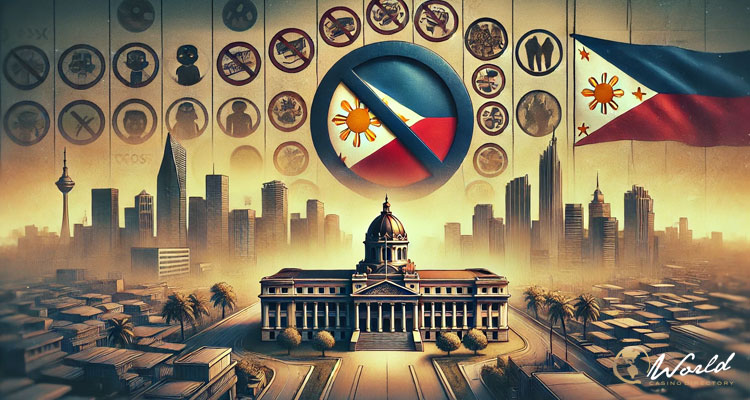
In a significant regulatory move, Philippines President Ferdinand Marcos Jr. has issued Executive Order (EO) No. 74, enacting an immediate prohibition on all Philippine Offshore Gaming Operators (POGOs) and related offshore gaming activities in the country. Signed on November 5, the EO formalizes the POGO ban, initially declared during Marcos’ State of the Nation Address in July, and mandates a complete wind-down of all such operations by December 31, 2024.
The comprehensive directive covers not only POGO licensees but also entities reclassified under the newer designation of Internet Gaming Licensees (IGLs), effectively including all operators that cater to international audiences through online gaming. Both POGOs and IGLs have faced criticism over alleged associations with organized crime, a point underscored by the Marcos administration as the driving force behind the ban. By introducing a clear framework, the EO also aims to eliminate any ambiguity around which entities fall under the prohibition.
The EO further defines and restricts several auxiliary services tied to offshore gaming, according to PhilStar. This includes POGO Gaming Agents who represent offshore-based licensees, POGO service providers—such as local business process outsourcing (BPO) centers—and firms providing strategic or IT support, live studio streaming, or gaming software for offshore operations. The EO underscores that all online games of chance—including live-streamed e-casino games, random number generator games, and online sports betting—are exclusively directed at players outside of the Philippines. Any POGO or IGL operating without appropriate licenses is now classified as illegal and will face heightened government crackdowns.
Multi-Agency Coordination and Enforcement
To execute the EO’s mandates effectively, two technical working groups (TWGs) have been created. The Anti-Illegal Offshore Gaming Operations Working Group will focus on eliminating unlicensed POGO operations, tracking violations, and coordinating deportations of any foreign nationals involved in illicit gaming activities. This TWG will operate under the leadership of the Presidential Anti-Organized Crime Commission (PAOCC) with the Department of Justice (DOJ) as vice-chair.
The second group, the Employment Recovery and Reintegration Working Group, is tasked with mitigating the economic impact of the ban by facilitating job placements, reskilling, and upskilling for displaced workers within the industry. Chaired by the Philippine Amusement and Gaming Corporation (PAGCOR) and vice-chaired by the Department of Labor and Employment (DOLE), this group is expected to address the employment disruption that will follow the cessation of POGO operations.
Guidance for Government Agencies and the Private Sector
The EO also outlines specific duties for multiple government departments. PAGCOR, the primary gaming regulatory body, has been instructed to expedite the collection of outstanding fees and taxes associated with POGO operations. Meanwhile, local government units (LGUs) are empowered to implement the ban within their jurisdictions and must report any violations related to unauthorized offshore gaming.
For the private sector, the government has urged landlords and service providers, such as internet and utility companies, to consider waiving penalties or early termination fees for POGO operators as they wind down their activities. This request aims to ease the operational exit for businesses that might be affected by the abrupt halt in offshore gaming.
Impact on Foreign Investment and Tourism
The Marcos administration has argued that the POGO sector poses significant “reputational risks” that could deter foreign investment and undermine the nation’s broader economic and tourism goals. With the Philippines looking to establish itself as a stable and attractive destination for international business, the association of POGOs with crime and social challenges was cited as a threat to the country’s image. The administration emphasized that the ban seeks to reduce crime rates, address social concerns, and protect vulnerable individuals who might be exploited within this industry.
The Philippine Department of Justice has also extended warnings to international jurisdictions, such as Timor-Leste, highlighting potential issues that may arise if POGO operators attempt to relocate their businesses abroad. The DOJ’s cautionary outreach underscores concerns that former POGO entities might resume operations in regions with less stringent regulatory oversight.
In India, cricket is by far the most popular sport, and sports betting often peaks around major cricket tournaments like the IPL (Indian Premier League), ICC World Cup, or Test series. Other popular sports for betting include football, kabaddi, and horse racing.
The best time to play stake in India depends on several factors, including the type of game you're playing, the events or promotions running, and your personal gaming habits. To get the most out of your betting or casino experience, consider playing during peak sports events, taking advantage of promotions, or opting for off-peak hours for more relaxed play.
Whether it’s a cricket match, a weekend casino bonus, or the perfect time to place your bets, timing can make all the difference in your gaming success.





